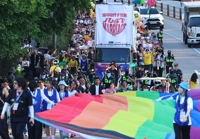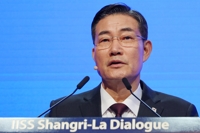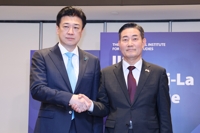#Korean history
Today in Korean History
-
-
#Korean history
Today in Korean history
June 2 1592 -- Joseon Dynasty Adm. Yi Sun-shin and his combined fleet destroy 20 Japanese ships off the southeastern region of Dangpo. Yi's naval victory was partly thanks to his "Turtle Boats," constructed in the previous year to effectively protect Korean soldiers from Japanese attacks. The... 14:00 Jun. 01 -
Today in Korean history
June 1 1981 -- The Kyobo Book Center, or Kyobo Mungo, opens in the Kyobo Building in Gwanghwamun, central Seoul. The bookshop is the largest and most famous bookstore in South Korea, now boasting 10 stores across the country. 1982 -- Fifty-three soldiers are killed as a military transporta... 14:00 May. 31 -
#Korean history
Today in Korean history
May 31 1886 -- Ewha Womans University is established in Seoul on the initiative of Mary Scranton, an American missionary from the Methodist Episcopal Church. The school's name, Ehwa, was bestowed by Korean Emperor Gojong. 1895 -- Emperor Gojong issues an order to use the Korean language f... 14:00 May. 30 -
#Korean history
Today in Korean history
May 30 1930 -- Ethnic Koreans residing in Manchuria carry out an uprising against Japan's colonization of Korea. 1968 -- Kim Jong-pil (1926-2018) announces his retirement from politics, also stepping down as the head of the ruling Democratic Republican Party over a series of scandals in... 14:00 May. 29 -
#Today in Korean history
Today in Korean history
May 29 1957 -- Lee Hyo-chung becomes the first South Korean nurse to receive the Florence Nightingale Medal, the highest honor awarded to those distinguished in the nursing profession. The medal was instituted in 1912 by the International Committee of the Red Cross. 1960 -- Rhee Syng-man,... 14:00 May. 28 -
#Korean history
Today in Korean history
May 28 1905 -- A railroad linking the capital city of Seoul with the port city of Busan in the southeastern part of the country opens to passengers and cargo. 1973 -- The government announces a new law that outlines the timing and extent of legally permissible abortions. 1984 -- The ... 14:00 May. 27 -
#Today in Korean history
Today in Korean history
May 27 1966 -- The Japanese government returns some 1,300 cultural properties to Korea that were sent to Japan during the colonial period. 1968 -- The first S. Korea-U.S. defense ministers' talks begin in Washington. 2008 -- South Korea and China agree to elevate their bilateral relation... 14:00 May. 26 -
#Today in Korean history
Today in Korean history
May 26 1898 -- Korea opens three ports to foreign trade. People and goods from overseas begin to stream into the country through Masan, Gunsan and Hamheung. 1952 -- Around 50 opposition lawmakers are arrested by military police after they refused to support President Rhee Syng-man's propo... 14:00 May. 25 -
#today history
Today in Korean history
May 25 1946 -- Leading left- and right-wing politicians in the southern part of the Korean Peninsula, including Kim Kyu-sik and Yea Woon-heong, start talks as part of their long-term plan to form a united front and, later, a Korean government on the peninsula. 1950 -- South Korea joins th... 14:00 May. 24 -
#Today in Korean history
Today in Korean history
May 24 1947 -- Former independence fighter and nationalist Yeo Un-hyeong launches a center-left party called the Geulloinmindang (Labor People Party) seeking to unify Korea, divided by the shared occupation by the United States and the Soviet Union. Yeo's efforts failed, however, as he was as... 14:00 May. 23 -
#Korean history
Today in Korean history
May 23 1985 -- South Korean university students storm into a U.S. cultural center in Seoul and launch a sit-in. The protesters demanded the U.S. apologize for allegedly overlooking a bloody crackdown by South Korea's then military-backed regime on anti-government protests in the southern city... 14:00 May. 22 -
#Korean history
Today in Korean history
May 22 1882 -- Korea's Joseon Dynasty (1392-1910) and the United States reach a trade agreement. 1907 -- Lee Wan-yong, a politician and Japanese collaborator during the Joseon Dynasty, is appointed prime minister. The Euijeongbu, the dynasty's highest administrative body, is transformed i... 14:00 May. 21 -
#Today in Korean history
Today in Korean history
May 21 1947 -- The second U.S.-Soviet Joint Commission opens to discuss forming a joint transitional government and trusteeship in Korea. The talks broke off on July 10. The ideological divide between Washington and Moscow that was reflected in southern and northern Korea, respectively, led t... 14:00 May. 20 -
#Today in Korean history
Today in Korean history
May 20 1949 -- Kim Yak-su and Lee Mun-won, lawmakers in South Korea's first National Assembly, are arrested for arguing for the withdrawal of foreign troops from the country and negotiations on the reunification of the two Koreas. As a result of their assertions, the two were accused o... 14:00 May. 19 -
#Korean history
Today in Korean history
May 19 1970 -- South Korea establishes diplomatic relations with Cambodia. 1980 -- Tens of thousands of students and other citizens stage demonstrations in the southwestern city of Gwangju, calling for an end to martial law and the release of dissident leader Kim Dae-jung. 1983 -- Opp... 14:00 May. 18 -
#Korean history
Today in Korean history
May 18 1970 -- South Korea establishes diplomatic relations with Cambodia. 1980 -- The May 18 Gwangju Democratization Movement takes place. Tens of thousands of students and other citizens stage demonstrations in the southwestern city of Gwangju protesting against then military junta lead... 14:00 May. 17 -
#Korean history
Today in Korean history
May 17 1973 -- North Korea joins the World Health Organization. South Korea acquired membership in 1949. 1980 -- South Korea's then military government, led by Chun Doo-hwan, expands its enforcement of emergency martial law nationwide and arrests two leading opposition leaders, Kim Dae-ju... 14:00 May. 16 -
#Today in Korean history
Today in Korean history
May 16 1973 -- North Korea joins the World Health Organization. South Korea became a member in 1949. 1980 -- The military government of Chun Doo-hwan expands its use of emergency martial law nationwide and arrests two leading opposition leaders, Kim Dae-jung and Kim Jong-pil, on charges o... 14:00 May. 15 -
#Today in Korean history
Today in Korean history
May 15 1712 -- Korea's Joseon Dynasty (1392-1910) government erects a stone monument on Mount Baekdu to mark the border with China, then ruled by the Qing Dynasty. 1956 -- Rhee Syng-man is elected South Korea's president for a third consecutive term. Rhee, an advocate of Korean independen... 14:00 May. 14
-
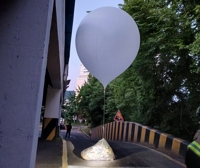 N. Korea sends some 600 trash-carrying balloons to S. Korea from Saturday: Seoul's military
N. Korea sends some 600 trash-carrying balloons to S. Korea from Saturday: Seoul's military -
 (2nd LD) N. Korea sends some 90 balloons carrying trash to S. Korea: Seoul's military
(2nd LD) N. Korea sends some 90 balloons carrying trash to S. Korea: Seoul's military -
 (LEAD) N. Korea sends some 600 trash-carrying balloons to S. Korea from Saturday
(LEAD) N. Korea sends some 600 trash-carrying balloons to S. Korea from Saturday -
 (3rd LD) N. Korea sends some 720 more trash-carrying balloons to S. Korea, continues GPS jamming for 5 days
(3rd LD) N. Korea sends some 720 more trash-carrying balloons to S. Korea, continues GPS jamming for 5 days -
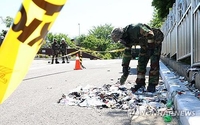 Vehicle damaged by trash-carrying balloons from N. Korea
Vehicle damaged by trash-carrying balloons from N. Korea
